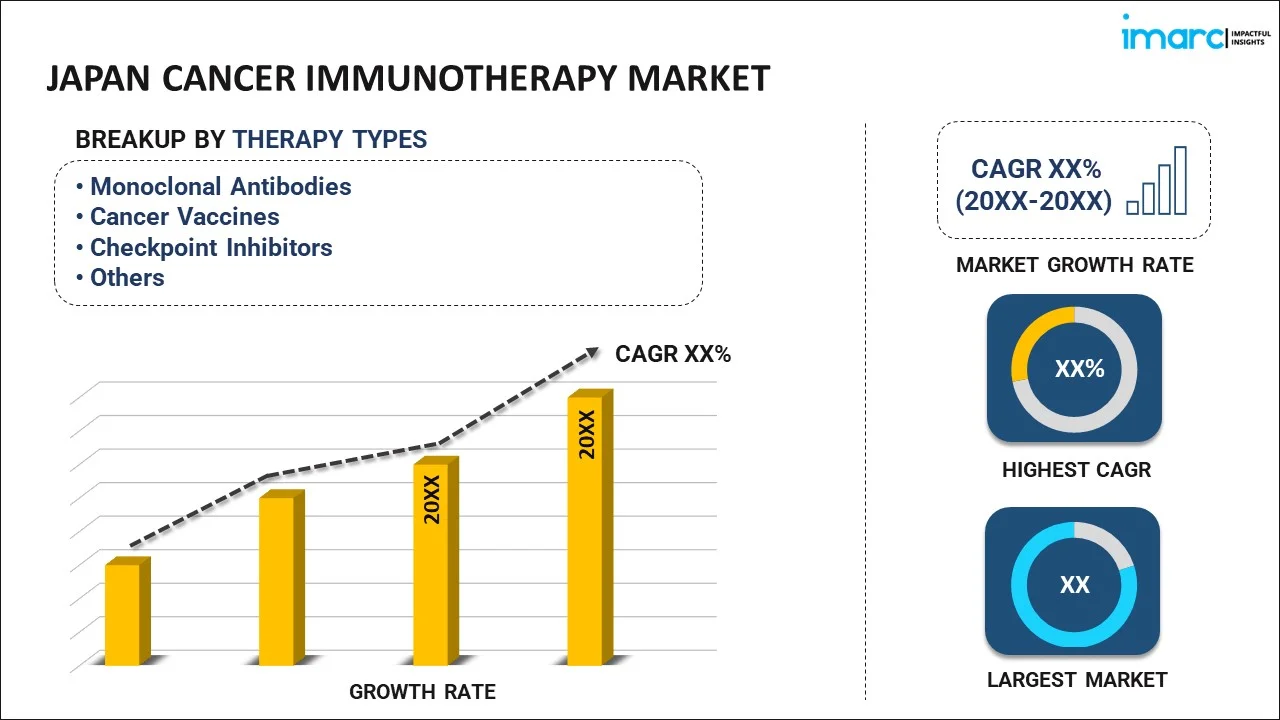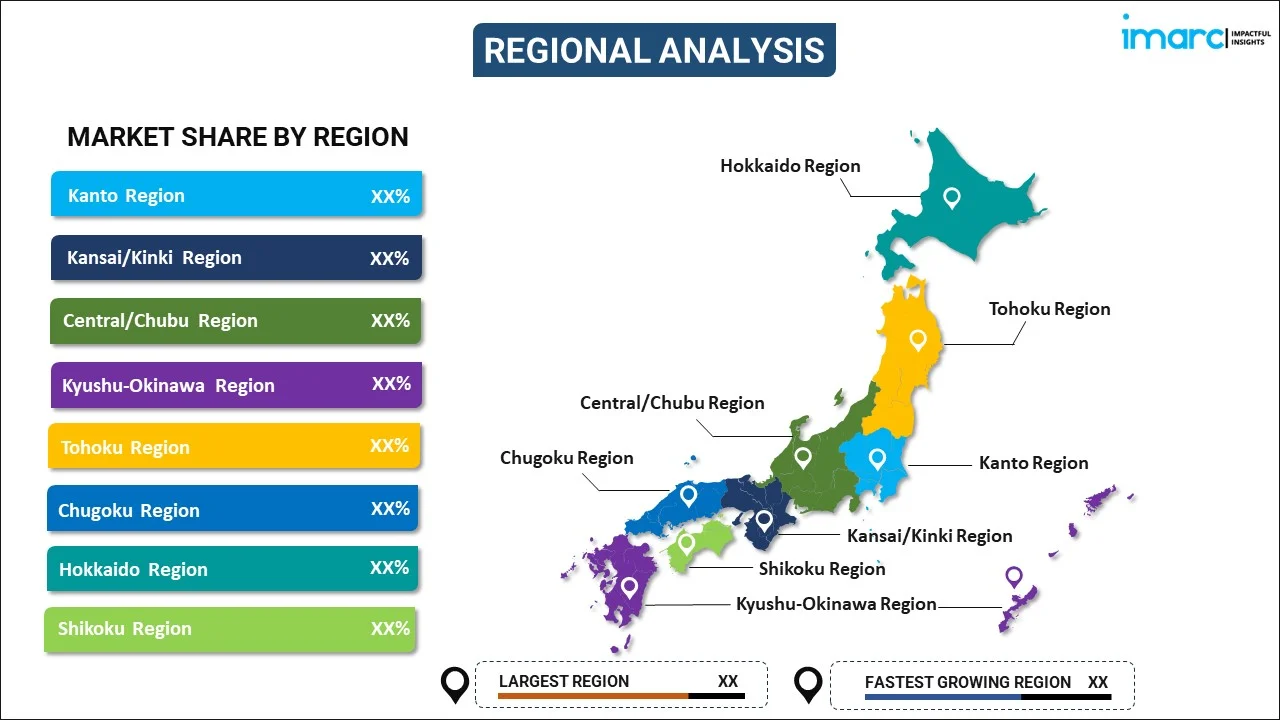
Japan Cancer Immunotherapy Market Report by Therapy Type (Monoclonal Antibodies, Cancer Vaccines, Checkpoint Inhibitors, Immunomodulators, and Others), Application (Lung Cancer, Breast Cancer, Colorectal Cancer, Melanoma, Prostate Cancer, Head and Neck Cancer, and Others), End User (Hospitals, Cancer Research Centers, Clinics, and Others), and Region 2026-2034
Market Overview:
Japan cancer immunotherapy market size reached USD 8,084.2 Million in 2025. Looking forward, IMARC Group expects the market to reach USD 15,023.3 Million by 2034, exhibiting a growth rate (CAGR) of 7.13% during 2026-2034. The market is being propelled by several significant factors, including an increasing incidence of cancer cases, supportive government programs, and the widespread accessibility of medical insurance.
|
Report Attribute
|
Key Statistics
|
|---|---|
|
Base Year
|
2025 |
|
Forecast Years
|
2026-2034 |
|
Historical Years
|
2020-2025
|
| Market Size in 2025 | USD 8,084.2 Million |
| Market Forecast in 2034 | USD 15,023.3 Million |
| Market Growth Rate (2026-2034) | 7.13% |
Cancer is a medical condition characterized by the uncontrolled growth and spread of certain cells in the body to various parts. Its development is often linked to factors such as alcohol or tobacco consumption, an unhealthy diet, exposure to air pollution, and a lack of physical activity. Individuals affected by cancer can experience significant health challenges, including feelings of anxiety, depression, fear of mortality, pain, stress, and even thoughts of suicide. Immunotherapy is an approach to cancer treatment involving the use of antibodies that bind to and inhibit the activity of proteins produced by cancer cells. This method helps strengthen the immune system's ability to identify and eliminate abnormal cancer cells within the body. Consequently, it finds widespread application in the treatment of various cancer types, including lung, breast, colorectal, melanoma, prostate, head and neck, thyroid, kidney, liver, cervical, bladder, ovarian, and skin cancers.
Japan Cancer Immunotherapy Market Trends:
In the context of the Japanese market, several significant factors are positively impacting the cancer immunotherapy sector. One of the primary drivers is the rising number of cancer cases, attributed to poor dietary habits and exposure to harmful substances among individuals worldwide. Additionally, there is a growing awareness regarding diverse cancer treatment options among the global population, contributing to market expansion. Furthermore, the increasing adoption of cancer immunotherapies is driven by their ability to offer prolonged progression-free survival (PFS) and overall survival (OS) compared to traditional anti-tumor therapies. The availability and accessibility of medical insurance, alongside rising healthcare expenditure, are presenting attractive growth prospects for industry investors. Moreover, there is a growing demand for treatment approaches with fewer adverse effects, which aligns with the increasing approval of novel immunotherapies and fuels market growth. Government agencies and non-profit organizations in various countries are actively promoting the adoption of cancer immunotherapy through widespread awareness campaigns focused on cancer prevention. Lastly, the market benefits from ongoing technological advancements in cancer treatment therapies, which are enhancing the efficiency of disease management strategies. These factors collectively contribute to the positive growth trajectory of the cancer immunotherapy market in Japan.
Japan Cancer Immunotherapy Market Segmentation:
IMARC Group provides an analysis of the key trends in each segment of the market, along with forecasts at the country level for 2026-2034. Our report has categorized the market based on therapy type, application, and end user.
Therapy Type Insights:

- Monoclonal Antibodies
- Cancer Vaccines
- Checkpoint Inhibitors
- Immunomodulators
- Others
The report has provided a detailed breakup and analysis of the market based on the therapy type. This includes monoclonal antibodies, cancer vaccines, checkpoint inhibitors, immunomodulators, and others.
Application Insights:
- Lung Cancer
- Breast Cancer
- Colorectal Cancer
- Melanoma
- Prostate Cancer
- Head and Neck Cancer
- Others
A detailed breakup and analysis of the market based on the application have also been provided in the report. This includes lung cancer, breast cancer, colorectal cancer, melanoma, prostate cancer, head and neck cancer, and others.
End User Insights:
- Hospitals
- Cancer Research Centers
- Clinics
- Others
The report has provided a detailed breakup and analysis of the market based on the end user. This includes hospitals, cancer research centers, clinics, and others.
Regional Insights:

- Kanto Region
- Kansai/Kinki Region
- Central/ Chubu Region
- Kyushu-Okinawa Region
- Tohoku Region
- Chugoku Region
- Hokkaido Region
- Shikoku Region
The report has also provided a comprehensive analysis of all the major regional markets, which include Kanto Region, Kansai/Kinki Region, Central/ Chubu Region, Kyushu-Okinawa Region, Tohoku Region, Chugoku Region, Hokkaido Region, and Shikoku Region.
Competitive Landscape:
The market research report has also provided a comprehensive analysis of the competitive landscape. Competitive analysis such as market structure, key player positioning, top winning strategies, competitive dashboard, and company evaluation quadrant has been covered in the report. Also, detailed profiles of all major companies have been provided.
Japan Cancer Immunotherapy Market Report Coverage:
| Report Features | Details |
|---|---|
| Base Year of the Analysis | 2025 |
| Historical Period | 2020-2025 |
| Forecast Period | 2026-2034 |
| Units | Million USD |
| Scope of the Report | Exploration of Historical and Forecast Trends, Industry Catalysts and Challenges, Segment-Wise Historical and Predictive Market Assessment:
|
| Therapy Types Covered | Monoclonal Antibodies, Cancer Vaccines, Checkpoint Inhibitors, Immunomodulators, Others |
| Applications Covered | Lung Cancer, Breast Cancer, Colorectal Cancer, Melanoma, Prostate Cancer, Head and Neck Cancer, Others |
| End Users Covered | Hospitals, Cancer Research Centers, Clinics, Others |
| Regions Covered | Kanto Region, Kansai/Kinki Region, Central/ Chubu Region, Kyushu-Okinawa Region, Tohoku Region, Chugoku Region, Hokkaido Region, Shikoku Region |
| Customization Scope | 10% Free Customization |
| Post-Sale Analyst Support | 10-12 Weeks |
| Delivery Format | PDF and Excel through Email (We can also provide the editable version of the report in PPT/Word format on special request) |
Key Questions Answered in This Report:
- How has the Japan cancer immunotherapy market performed so far and how will it perform in the coming years?
- What has been the impact of COVID-19 on the Japan cancer immunotherapy market?
- What is the breakup of the Japan cancer immunotherapy market on the basis of therapy type?
- What is the breakup of the Japan cancer immunotherapy market on the basis of application?
- What is the breakup of the Japan cancer immunotherapy market on the basis of end user?
- What are the various stages in the value chain of the Japan cancer immunotherapy market?
- What are the key driving factors and challenges in the Japan cancer immunotherapy?
- What is the structure of the Japan cancer immunotherapy market and who are the key players?
- What is the degree of competition in the Japan cancer immunotherapy market?
Key Benefits for Stakeholders:
- IMARC’s industry report offers a comprehensive quantitative analysis of various market segments, historical and current market trends, market forecasts, and dynamics of the Japan cancer immunotherapy market from 2020-2034.
- The research report provides the latest information on the market drivers, challenges, and opportunities in the Japan cancer immunotherapy market.
- Porter's five forces analysis assist stakeholders in assessing the impact of new entrants, competitive rivalry, supplier power, buyer power, and the threat of substitution. It helps stakeholders to analyze the level of competition within the Japan cancer immunotherapy industry and its attractiveness.
- Competitive landscape allows stakeholders to understand their competitive environment and provides an insight into the current positions of key players in the market.
Need more help?
- Speak to our experienced analysts for insights on the current market scenarios.
- Include additional segments and countries to customize the report as per your requirement.
- Gain an unparalleled competitive advantage in your domain by understanding how to utilize the report and positively impacting your operations and revenue.
- For further assistance, please connect with our analysts.
 Request Customization
Request Customization
 Speak to an Analyst
Speak to an Analyst
 Request Brochure
Request Brochure
 Inquire Before Buying
Inquire Before Buying




.webp)




.webp)












